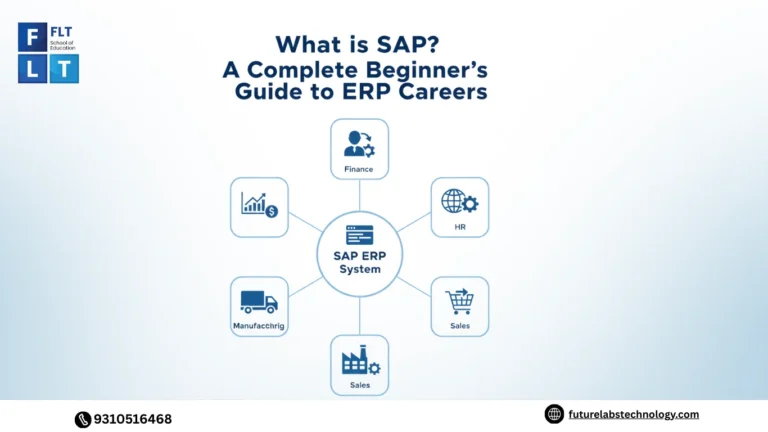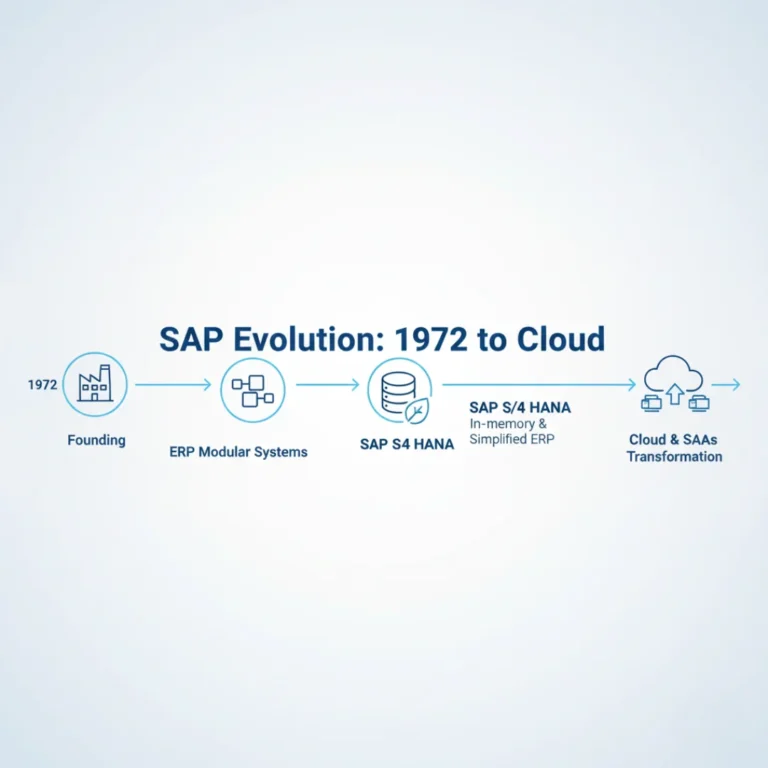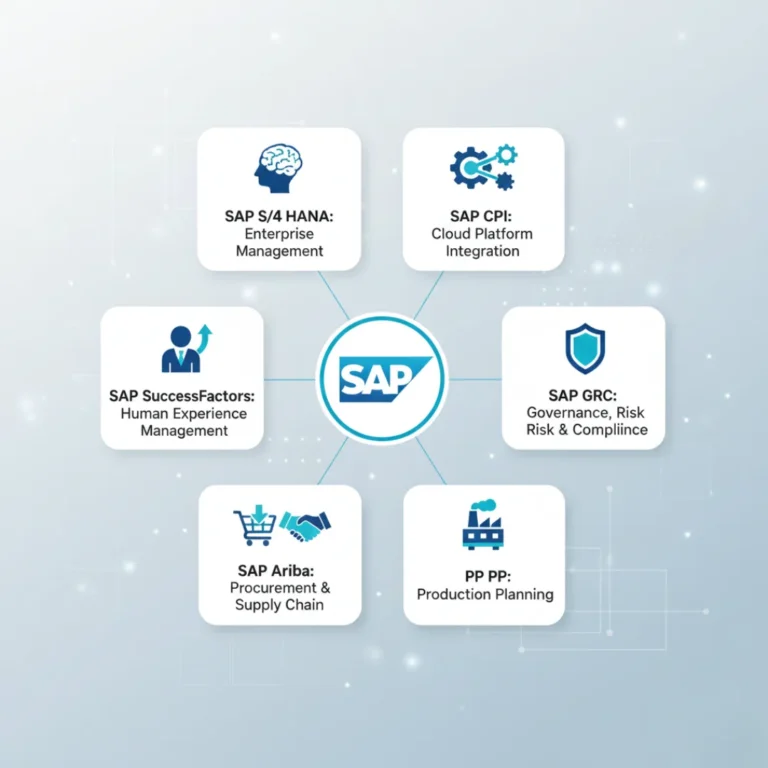
What is SAP? A Beginner-Friendly Guide to ERP Careers
There are two kinds of people in this world: the first kind believes that planning is at the core of any business, while the second kind claims that execution is what truly matters. Whichever value you hold, ERP is your path to achieving it.
As the #1 enterprise application in the global market, this ERP system helps businesses streamline and integrate their diverse functions and processes to ensure smooth operations. But what exactly is SAP? According to a recent statistics report, about 86% of Fortune 500 companies and 92% of Forbes Global 2000 companies rely on this enterprise software to manage their operations efficiently.
With such widespread usage of ERP platforms globally, there is a growing demand for professionals skilled in managing these systems. Careers in ERP consultancy are booming in over 145 countries today, with India emerging as a major hub.
Nevertheless, many young professionals in the country are still unfamiliar with the industry and its scope of work.
In this blog, we aim to answer the question, “What is SAP?” and help professionals and jobseekers understand its applications, career potential, and how it can shape a bright future. Those who seek professional guidance can explore programs offered by Future Labs Technology.
For individuals aiming to validate their expertise, earning a recognized SAP Global Certification can significantly boost career prospects. Additionally, interested learners can review the full curriculum and enrollment options through the complete range of SAP Courses offered by FLT.
Table of Contents
ERP sysytem- History and Importance
Why ERP Skills Are in High Demand
Different ERP Solutions Available Today
SAP S/4 HANA
ERP Cloud Platform Integration (CPI)
ERP SuccessFactors
ERP Governance, Risk, and Compliance (GRC)
SAP Ariba
ERP Production Planning (PP)
Career Opportunities in SAP
Become a Certified SAP Consultant at FLT
Conclusion
Frequently Asked Questions (FAQs)
ERP system- Its History and Importance

Let’s begin from the beginning; SAP stands for Systems, Applications, and Products in Data Processing. This software company is much older than you’d guess. It was founded back in 1972 in Germany and was the brainchild of five former IBM employees.
The initial vision of SAP was to develop a software that could process real-time data in financial accounting. However, the company’s flagship product was launched much later – in the 1980s. It had a modular structure to provide businesses an opportunity to integrate and customize various business functions in one place.
This product gave way to SAP’s Enterprise Resource Planning (ERP) software, which quickly gained global popularity, allowing the company to expand its clientele and boundaries.
After a decade-long successful run, SAP updated itself as a cloud platform and started offering its software as a service (SaaS) in 2012. It has also since acquired a number of software companies to expand and elevate the possibility of providing better, more customized, and updated enterprise software solutions to businesses around the world.
Fun fact: The German translation of SAP – also considered its original name – is Systeme, Anwendungen und Produkte in der Datenverarbeitung.
Why ERP Skills Are in High Demand Across Industries
As organizations expand digitally, they require systems that offer real-time insights and operational efficiency. SAP fulfills this need by centralizing enterprise data and enabling smarter decision-making.
Additionally, SAP professionals enjoy strong career stability, global exposure, and competitive salary packages. With digital transformation accelerating across industries, SAP expertise remains future-proof and highly valuable.

Different ERP solutions available today
We wouldn’t be surprised if learning about the innovative journey of ERP System motivated you to pursue a career in it. However, as a beginner, you might wonder where to even start. Fortunately, we are here to guide you.
In addition, there is a wide range of solutions that the software company offers to cater to diverse business needs. To help you get started, below we’ll discuss some of the most widely used ERP software and explain what they’re used for. By understanding these options, you might gain a clearer idea of which field you want to explore further.
Take a look at the following:
1. SAP S/4 HANA
The flagship ERP software product of SAP, S/4 HANA, is a next-generation system built on the in-memory database platform to facilitate real-time data analysis. Its functionality touches various areas of a business, including procurement, supply chain, sales, finance, and more.
SAP S/4 HANA is also compatible to be integrated with other ERP software.
2. ERP Cloud Platform Integration (CPI)
Just as its name depicts, the SAP CPI is a cloud-based integration platform to support various integrations within a business, such as application-to-application (A2A) and business-to-business (B2B).
Another key feature of SAP CPI is the diverse connectivity options it offers to integrate various data sources and systems, such as web services, third-party applications, and databases.
5. SAP Ariba
Ariba is a supply-chain management platform offered by SAP built to automate and streamline all the supply-chain processes of businesses. These processes include procurement, catalog management, order tracking, and monitoring of the KPIs to measure process efficiency.
Many businesses have claimed that SAP Ariba has helped them cut costs in their supply-chain processes and provided enhanced collaboration with suppliers.
3. ERP Success Factors
A human capital management suite offered by SAP, SAP Success Factors is an inclusive toolkit to manage the functionality of HR, workforce engagement, and talent management.
Right from recruitment to career development and succession, SAP Success Factors can handle it all!
4. ERP Governance, Risk, and Compliance (GRC) Security
The SAP GRC Security solutions are focused on helping businesses enforce proper governance across operations, mitigate risks, and maintain compliance with policies and regulations.
SAP GRC Security also facilitate businesses to incorporate data protection measures and audit all of their security and compliance-related activities.
6. SAP Production Planning (PP)
SAP PP focuses on handling the planning and management of all the production activities within a business. The key processes of this system include:
Next-generation ERP suite
Cloud-based integration tools
Human capital management solutions
Risk and compliance frameworks
Procurement and supply chain platforms
Manufacturing and production planning systems
Become a Certified SAP Consultant at FLT!
As you might have gathered by now, the knowledge of ERP software has a lot of scope for professionals to build a successful career for themselves. But how does one gain this knowledge? By enrolling in ERP coursesand completing your SAP training Institute to become a certified SAP Consultant.
For those of you looking for a reputable SAP institute to enroll yourself in, you needn’t look any further. Widely regarded as the best SAP training institute in Noida, Future Labs Technology is right here to extend a helping hand.
With more than 20 years of experience, our IT training institute offers over 15 different ERP training courses in both offline and online modes. And the best part? With us, you can learn SAP within a week! Check out more details about our SAP Courses.
Conclusion
Overall, the ERP system has transformed how businesses operate by integrating planning and execution into a single intelligent system. From its early beginnings to its current cloud-based solutions, it is clear that ERP continues to shape the future of enterprise technology.
For professionals and students alike, moreover, building a career in ERP offers global exposure, financial growth, and long-term stability. By acquiring the right training and certification, you can confidently step into the world of ERP, making it a truly rewarding decision.
(FAQs)
1. What is SAP used for?
SAP is used to manage and integrate core business processes such as finance, HR, supply chain, production, and customer relations.
2. Is SAP a good career option in India?
Yes, India is a major hub for SAP projects, offering strong demand, competitive salaries, and global opportunities.
3. Do I need a technical background to learn SAP?
Not necessarily. Many SAP modules are functional and suitable for commerce, management, and non-technical graduates.
4. How long does it take to learn SAP?
The learning duration depends on the module and training intensity. With structured programs, SAP fundamentals can be learned quickly.
5. Are SAP certifications important?
Yes, certifications validate your skills and significantly improve employability in domestic and international markets.
